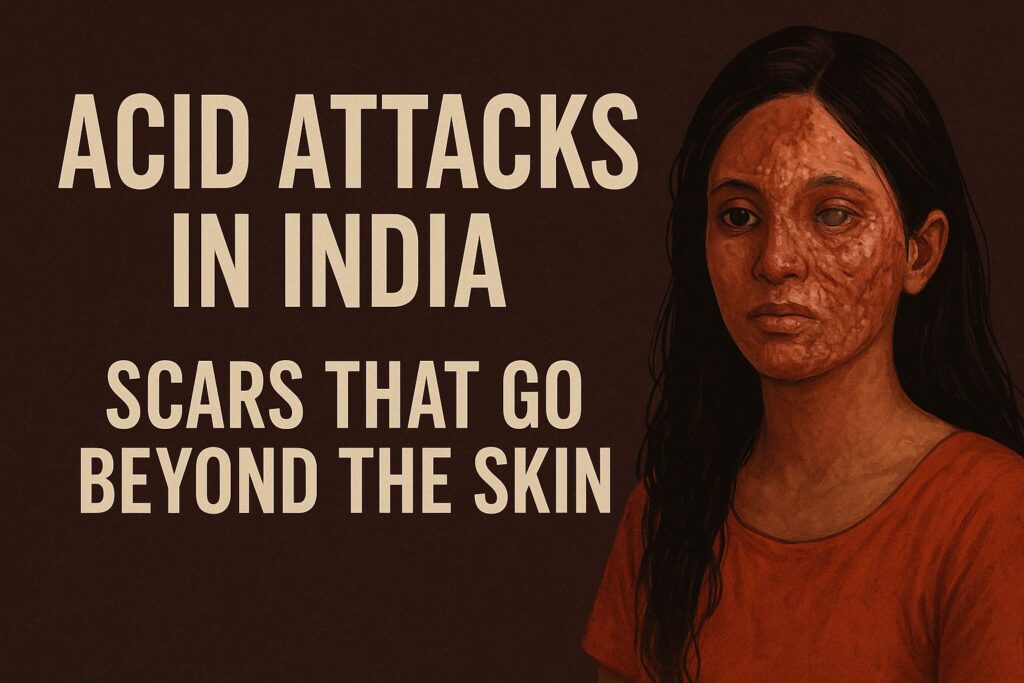Acid attacks remain one of the most brutal crimes against women in India. Despite progress in law and awareness, the recent tragic incident in Bhiwani — where a 17-year-old girl was attacked by her own father — reminds us that this heinous act is still a horrifying reality. Acid attacks are not just assaults on the body; they are assaults on dignity, confidence, and the very spirit of survival.
The Reality of Acid Attacks
An acid attack occurs when corrosive substances are deliberately thrown on a person to cause disfigurement, pain, and permanent scars. Most victims are women and girls, often targeted for rejecting proposals, disputes over dowry, property issues, or, tragically, for simply seeking independence and education.
According to the National Crime Records Bureau (NCRB), India records 200–250 acid attack cases annually on average. However, activists believe the actual number is higher, as many cases go unreported due to fear, stigma, or lack of access to justice.
The Impact on Survivors
The damage of an acid attack goes far beyond physical wounds:
- Physical Pain & Disfigurement: Severe burns, loss of eyesight, and multiple reconstructive surgeries.
- Psychological Trauma: Depression, anxiety, PTSD, and social isolation.
- Economic Hardship: Victims often face job loss, financial instability, and long-term medical expenses.
- Social Stigma: Survivors frequently battle rejection and discrimination in personal and professional life.
Yet, despite unimaginable suffering, many survivors rise as symbols of courage and resilience. Their stories are a testament to human strength.
Legal Protection in India
India has strengthened its legal framework to combat acid attacks:
- IPC Sections 326A & 326B: Punish perpetrators with imprisonment up to 10 years to life and fines.
- Supreme Court Directions (2013): Regulated acid sale and mandated free medical treatment for survivors.
- Victim Compensation Schemes: State governments are required to provide compensation (₹3–10 lakh).
While laws exist, implementation and support systems remain weak. Survivors often struggle with delayed justice, inadequate compensation, and insufficient rehabilitation.
Support & Hope
Several NGOs like Make Love Not Scars, kavyaa, Chhanv Foundation, and Stop Acid Attacks are working tirelessly to provide medical aid, legal assistance, counseling, and livelihood opportunities for survivors.
Moreover, survivors themselves are becoming agents of change. Women like Laxmi Agarwal, an acid attack survivor and activist, continue to raise awareness and inspire millions to fight against gender-based violence.
What Can We Do?
Every citizen has a role to play in eradicating acid attacks:
- Demand Stricter Enforcement of laws regulating acid sale.
- Support Survivors through donations, volunteering, or amplifying their voices.
- Challenge Mindsets that normalize misogyny, patriarchy, and violence against women.
- Educate & Sensitize society, especially in schools and rural areas, about gender equality and respect.
Acid attacks are not just crimes against individuals; they are attacks on humanity and equality. To achieve a safer, inclusive India, we must move beyond sympathy and work towards systemic change, survivor support, and prevention.
The scars may remain, but with collective action, compassion, and justice, survivors can be empowered to live with dignity — and future generations can be protected from such violence.

